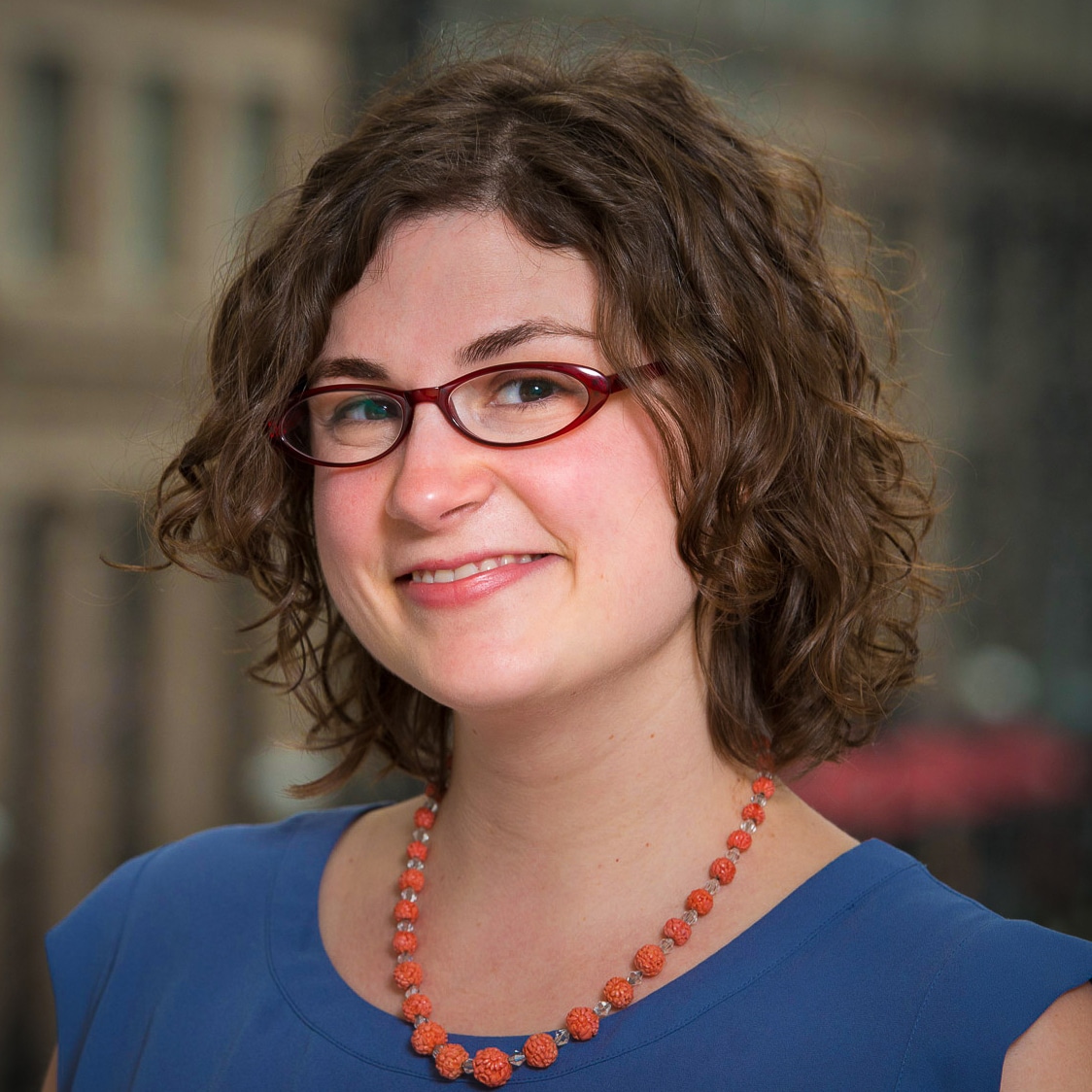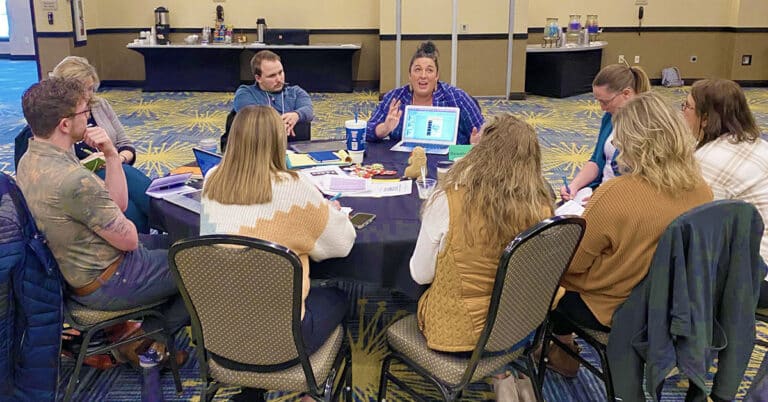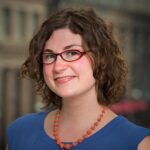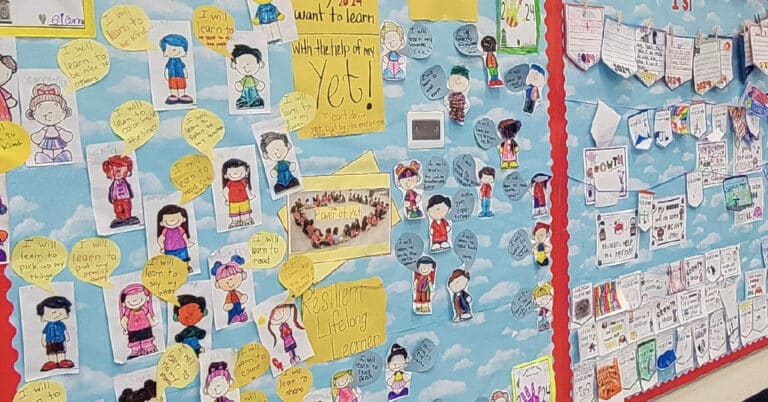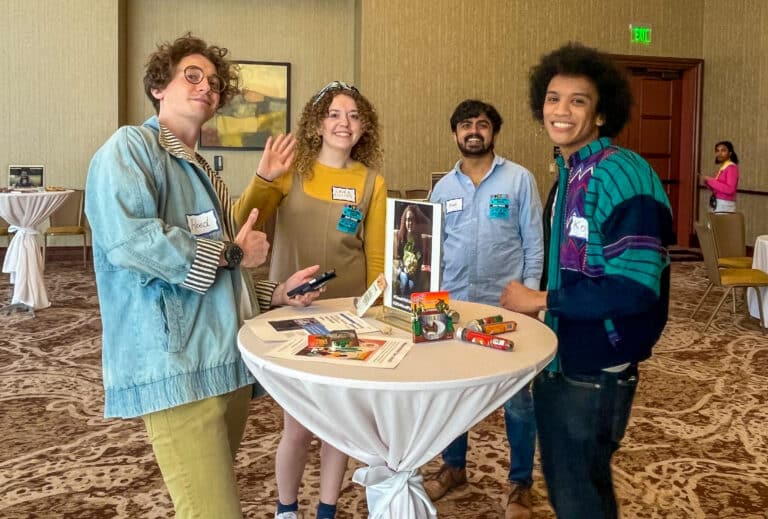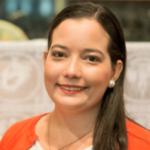When it comes to rethinking teaching and learning, there’s a grassroots movement brewing in the Bluegrass State.
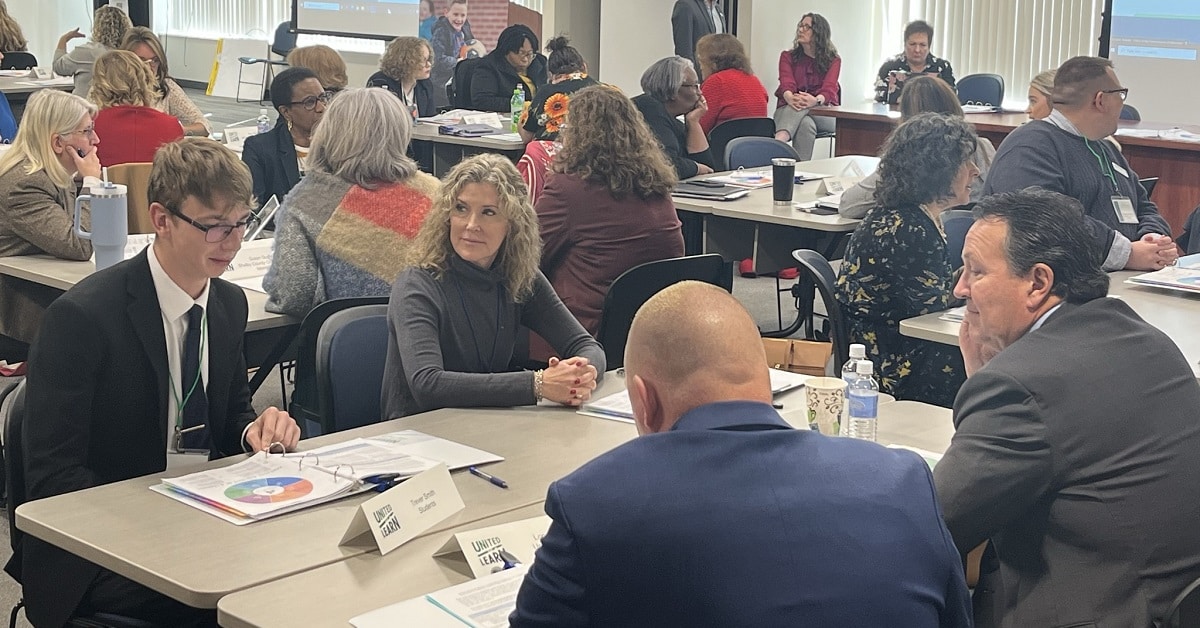
While the Kentucky United We Learn council builds on previous Kentucky Department of Education (KDE) initiatives, it centers the voices of stakeholders in a truly profound way. When forming the council, KDE’s recruiting goal was to be at least 10 percent more diverse than the state as a whole and capture a wide range of perspectives, especially from those who are typically not included in education policy conversations. For example, 12 percent of council members are students, and three of those students are active council chairs. According to Kentucky Board of Education Chair Lu S. Young, “You aren’t just invited to the table – this is our table.”
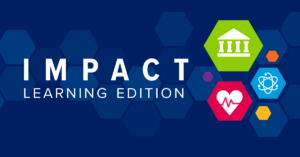
Create a new future, together. IMPACT: Learning Edition can spark discussions about the future in your learning communities.
Learn more »
When addressing the Kentucky United We Learn council’s first in-person convening in late November of 2022, Kentucky Education Commissioner and Chief Learner Jason E. Glass, stressed that not only would the council seek to include diverse stakeholders and individuals not normally involved in an education policy space – it would take direction from them, too.
“You represent a novel, exciting way for a state agency to engage with its state – to make sure that we’re receiving regular information, feedback, direction and advice,” Glass said. “What are the things we need to be doing as a state agency? What do I need to be doing as commissioner? How do we make sure we’re providing all the supports we can for students, families and the people working in our schools to deliver on our big ideas? You will help us keep the pulse of the state of Kentucky and what changes we need to make going forward.”
Three big ideas shift the center of power in education in Kentucky.
The Kentucky United We Learn council is organized around three big ideas and builds on the work of the Kentucky Coalition for Advancing Education. Every member of the council serves on a committee whose work aims to make those ideas a reality:
- Creating more vibrant learning experiences for each student that prepare them for our fast-paced world
- Accelerating innovation in Kentucky schools, especially as it relates to accountability and assessment
- Engaging in meaningful collaboration that ensures communities are being worked with, not talked at
Audrey Gilbert is a high school senior at Frankfort High School in Frankfort, Kentucky, and interim chair of the council. She is candid about their potential.
“We’re not lawmakers. We’re here to contribute our lived experiences and our ideas to do as much as we can to help change the education landscape in Kentucky,” said Gilbert. “Advising is a big part of what we do – active advising. We’re going out in the field, growing our understanding or what’s happening in communities and communicating those practical experiences out to the state and to policymakers. We need to ensure that the efforts moving forward are informed and influenced by people actively experiencing and contributing to education.”
Building a new reality for teaching and learning for students requires opportunities for the adults in their lives to experience a different way of doing things, expanding their ideas of what’s possible for education. For KDE, that wasn’t about being the experts in the room.
“They are committed to shifting the center of power in education systems,” said Doannie Tran, partner of liberatory co-creation at the Center for Innovation in Education, which supports KDE to plan and facilitate the Kentucky United We Learn council. “The Kentucky Department of Education is extremely aware that policies and decisions have been made in a top-down way in education systems for so long. You have to let the local stakeholders drive it, put your trust in them and create structures that allow for state education agencies and communities to work together.”
During the initial convening, attendees engaged in peer-learning. They heard from schools and districts throughout the state who were innovating in support of more student-centered practices. Some districts shared their approach to building a Portrait of a Graduate, while others spoke of how they built stronger community partnerships in support of expanding learning opportunities for students. Dr. Diane Hatchett, superintendent with Berea Independent School District in Berea, Kentucky, spoke of her district’s efforts to gather student and stakeholder voice.
“We tell students their voices matter – so we did surveys about the curriculum. We also surveyed parents and the community. Instead of us assuming what our communities need, we asked,” said Hatchettt.
Breaking the cycle of adults alone deciding how and what the education of young people looks like is a passion for Alfonso de Torres Núñez, and part of his drive to be involved in the council. A Spanish teacher at Bloom Elementary School in Louisville, Kentucky, De Torres Núñez is committed to seeing students’ voices represented in every conversation about education.
“It’s easy to make decisions from an office and forget how that’s going to impact the life of a student. Even when we have accrued years of experience and gained lots of knowledge in any field, we must overcome our own ego and deal with our own traumas if we truly want to serve people, especially our students. Only then we will be able to connect and trust,” said De Torres Núñez. “Trust is something difficult to foster and nurture in the education system because we’re so impacted by our experiences. When it comes to our students, it’s very easy to see them as people who don’t know very much yet. But they know much more than we think. They have been the recipients of every single decision we adults have made in education and we are still making; they have had a long time to observe, analyze and reflect. What about been listened to?”
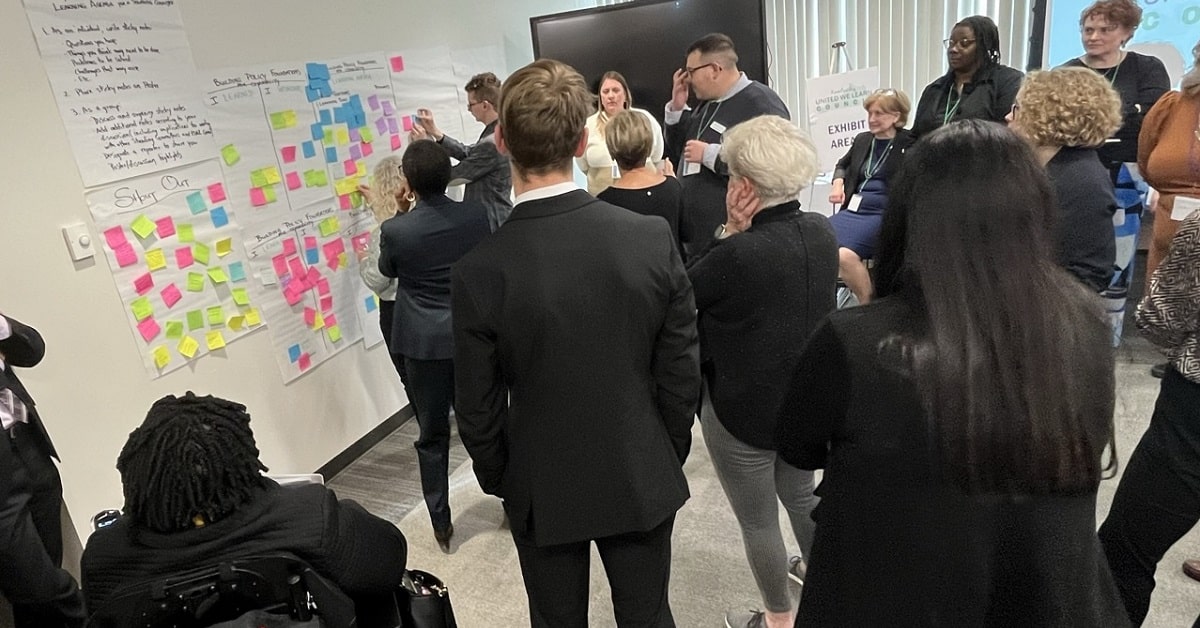
Blazing a trail toward student-centered accountability and assessment
Because of what they heard during community outreach tours and listening sessions throughout the state in the first year of Dr. Glass’s tenure, one of the areas that the Kentucky United We Learn council is prioritizing for change is something that many states don’t tackle until years into a shift toward student-centered learning: testing.
“How we rate and evaluate schools could be a barrier to the kinds of deeper learning that Kentuckians wanted to see,” said Glass.
That’s why the Kentucky United We Learn council is making assessment and accountability a big area of focus. Supported by a $3 million grant over the next four years through the 2022 Competitive Grants for State Assessments (CGSA) program from the U.S. Department of Education, assessment and accountability is an area where their approach reflects a desire to learn from and take direction from stakeholders. While examples were shared during the convening of possible alternate forms of assessment nationally and globally, it was clear that Kentucky would be charting its own path forward with stakeholder support.
“The Kentucky Department of Education is not coming to the table with a predetermined idea of what this needs to look like,” said Jon Alfuth, senior director of state policy with KnowledgeWorks. KnowledgeWorks is partnering with the Kentucky United We Learn council and KDE to help identify and address policy barriers to innovation. “They’re not looking for a blessing. They’re saying, ‘We want you to help us figure out what this is.’ They’re working community-up instead of top-down.”
Lillian Pace, vice president of policy and advocacy with KnowledgeWorks, agrees.
“There is a deep-seated belief in the state that if the community designs it, they will value it. And if the community values it, they will be engaged and motivated to hold themselves accountable to the success of all students,” Pace said.
In Fleming County Schools, for example, they’re utilizing student and community surveys to build a broader understanding of impact. They hold regular parent focus groups and their dashboard includes measures that their community have identified as meaningful and valuable.
“The state is providing the tools and resources necessary to support a high-quality process at the local level. This is not the state washing its hands [of the matter] – we’re becoming a facilitator, an enabler of long-term sustainable change,” said Susan Lyons. Lyons Assessment Counseling is partnering with KDE to support the work of the council.
Hatchett was among those who shared their district’s approach to assessment and accountability and was clear about finding the balance between delivering state-mandated assessments and making the process meaningful for learners.
“I asked the students, what can we do to make learning experiences more meaningful and vibrant? One student wanted to get credit for performance assessments. They wanted to know why they couldn’t learn from the people they were doing an internship with,” said Hatchett. “If we’re preparing them for the real world, why wouldn’t people in the real world assess their progress? That test score matters to the school and their parents, but what were they getting out of working hard for a test?”
Mark Daniels, director of innovation and virtual programs with The Corbin School of Innovation in Corbin, Kentucky, is also grappling with meaningful assessment. As part of better aligning how they’re measuring student performance with what they’re measuring, the school filmed interviews with students about their experiences taking assessments. Questions included how students felt about how they were being tested and what they would improve. Students shared a desire for greater flexibility not only in when they were tested but in how their days were structured, something that measured “an entire year’s worth of work” rather than performance on a single test. The school took that feedback and then worked to make that happen.
“It’s okay to let the students do, and show, rather than just take that test,” said Daniels.
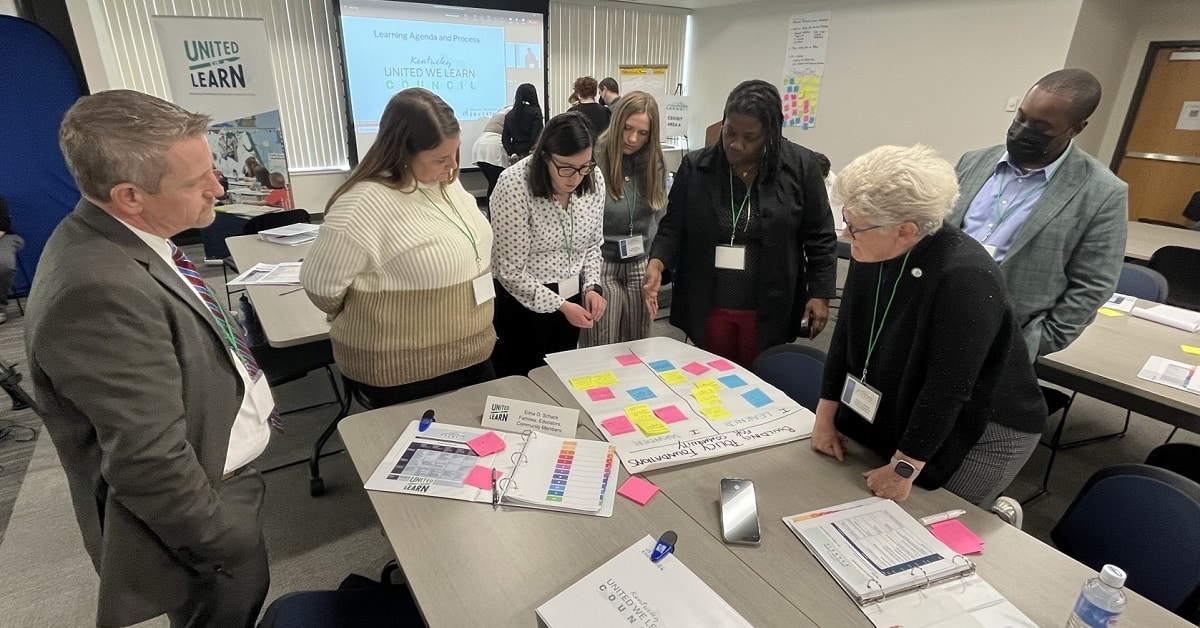
Establishing a roadmap for systems of accountability in Kentucky
Going forward, the Kentucky United We Learn council will meet in-person twice a year. The three committees will meet more often, working toward goals they identified at the initial convening in November 2022 aligned to the council’s three focus areas. At the end of four years, they aim to deliver a new roadmap for systems of accountability.
“We know we have to have assessment and accountability expectations at the federal and state level, but what if that system actually had space for regionalized systems to exist that were more closely connected to the communities and the values they share? It’s not about everyone doing the same thing all the time,” Pace said. “Communities are driving the narrative of what assessment and accountability might look like based on the measures that matter most to their success.”
When reflecting on all she’s learned and all that’s been shared by the council and with the council, Gilbert is excited for what’s next.
“I’ve been able to hear from actual educators about what’s happening in their schools. Everybody’s not doing the same thing. That flexibility and creativity has encouraged educators across the state to take this larger idea of innovative teaching and learning and make it their own,” said Gilbert. “They’re excited that these things are working for students. Learning can be exciting for everyone. Teaching can be exciting for everyone. We’re celebrating what’s happening and learning from each other.”
This framework is designed to help states build awareness of what it will take to evolve policy systems to support exploration, replication and ultimately statewide transformation to ensure personalized learning opportunities for all students.
